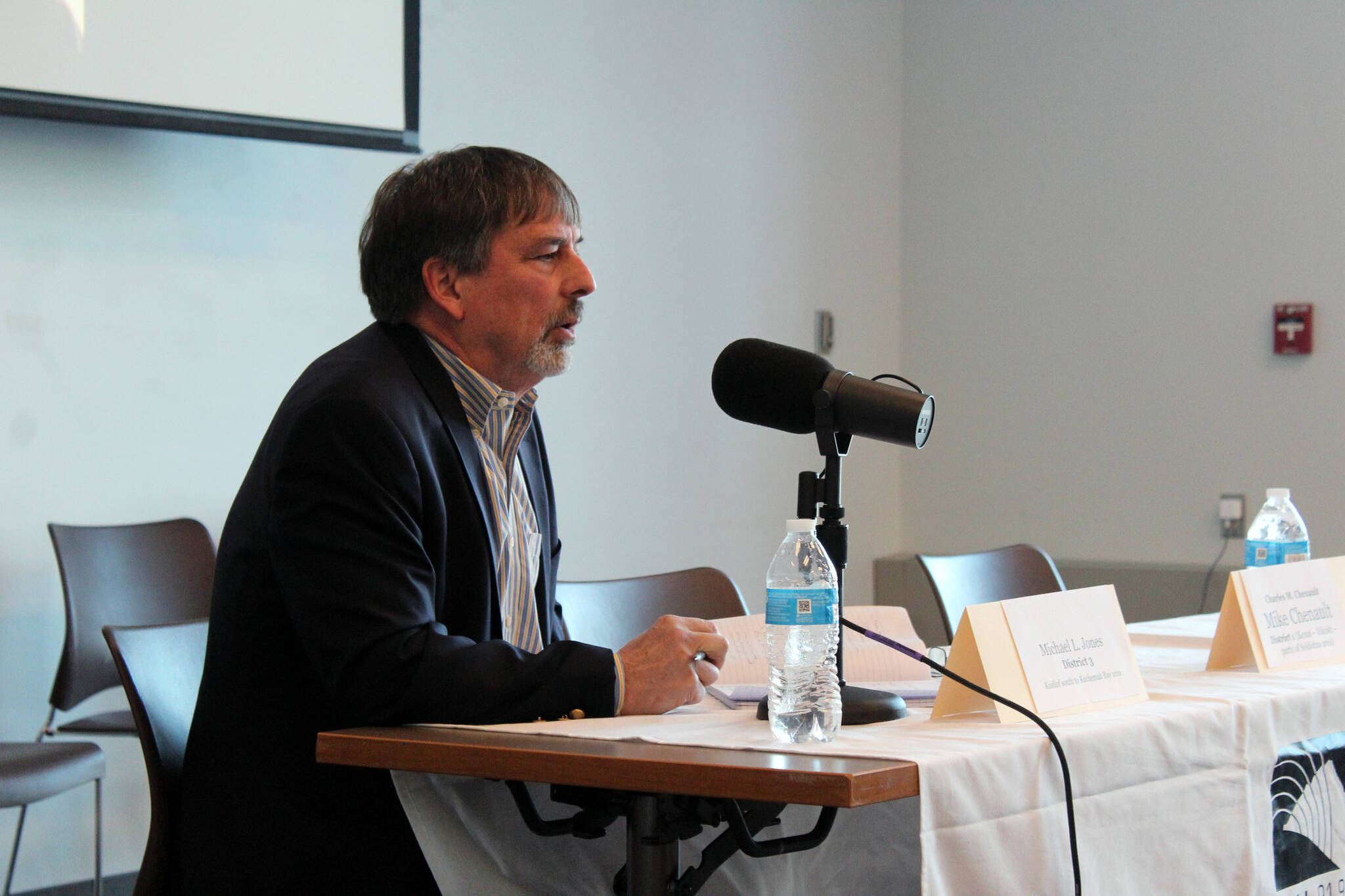Candidates running for seats on the Homer Electric Association Board of Directors gathered in the Soldotna Public Library on Monday, March 18 for a forum during which they shared their goals and vision for the future of the cooperative.
This year, five candidates are vying for three seats on the nine-member board. The forum was held by the Peninsula Clarion in partnership with KDLL 91.9 FM, KBBI 890 AM and the Central Peninsula League of Women Voters.
Crystal Schwartz-McKenney and Robert Wall are running for the board’s District 2 seat, which covers the communities of Soldotna, Sterling and Kasilof. Incumbent Louie Flora is running against Michael Jones for the board’s District 3 seat, which covers Kasilof south to Kachemak Bay. Mike Chenault is running unopposed for the board’s District 1 seat, which covers Kenai, Nikiski and parts of Soldotna.
Wall and Chenault, also incumbent candidates, were unable to participate in Monday’s forum.
HEA Board of Director terms last three years. Voting in HEA’s Board of Directors election begins March 29. Households can vote by returning their mail-in ballot, through HEA’s online voting portal or in person at HEA’s annual meeting on May 2 in Homer, where the results of the election will be announced.
Monday’s forum kicked off with a question about what candidates think HEA’s role is in responding to a looming shortage of natural gas supplies in Cook Inlet. The Alaska Department of Natural Resources in January 2023 reported that demand for Cook Inlet natural gas could outpace supply as soon as 2027 without new development in the basin’s active fields.
Hilcorp Alaska, LLC, which is responsible for more than 80% of the natural gas supplies produced in Cook Inlet, told HEA, Enstar and other utilities in 2022 that it did not have enough natural gas supply to enter new contracts after their current contracts expire. HEA and ENSTAR last spring signed a gas supply procurement agreement, through which HEA will buy gas from ENSTAR for the foreseeable future. HEA’s existing contract with Hilcorp expires this year, while ENSTAR’s runs through 2033.
Schwartz-McKenney said she thinks HEA needs to diversify its sources of natural gas, while Jones pointed to the inclusion of renewable resources in HEA’s strategic plan. Flora emphasized the need for an energy conservation strategy and said it’s important for HEA to continue its legislative advocacy work in Juneau.
“I don’t think our utility on its own can solve the crisis aside from promoting conservation and diversifying into renewable energy,” he said.
The three participating candidates had different philosophies regarding the import of liquefied natural gas as a way to meet the Kenai Peninsula’s energy demands. Jones said LNG imports are “just one of many tools” to consider and pushed back on the perception that to import is to have failed. Flora and Schwartz-McKenney said they don’t like the idea of being subject to variable market prices.
“Unfortunately, we have created a situation where we are so dependent that I understand why it may seem that we may need to import,” Schwartz-McKenney said. “As a long-term plan, I think that has a lot of negatives. It leaves us vulnerable to markets we have no control over.”
Candidates also diverged on the best way for HEA to set renewable energy goals. The current board voted in December to replace its renewable energy portfolio goal with a more general energy diversification policy. Under the renewable goal approved in 2021, board members pushed the cooperative to generate 50% of its energy needs from renewable sources by 2025.
Flora said he voted against removing the 50% threshold because he viewed it as aspirational for HEA to work toward and because renewables are the way of the future. Schwartz-McKenney said she was “mystified” by the board’s decision to remove its 50% goal, calling the broader policy “vague.”
Jones said he supports the board’s decision to move away from defined threshold, which he said is “renewables done wrong.”
“Everybody has a different interpretation of what that means,” Jones said. “Does it mean we’re going to hit 50% no matter what the cost? Because of those, kind of, ambiguities, it was not really a good policy to have in place. They’ve captured the essence of that in the strategic plan — I think that’s important.”
When it comes to keeping rates down for customers, both Jones and Flora pointed to HEA’s net metering program, which encourages members to reduce the amount of energy they purchase from HEA by developing renewable energy systems for their home. Candidates also shared their thoughts on HEA’s annual spending plan, the expansion of HEA’s service area and other energy projects they’d like to see the cooperative explore.
Monday’s forum can be streamed on KDLL’s website at kdll.org. A partial video recording of the forum is available on the Peninsula Clarion’s Facebook page.
Full candidate biographies and additional information about HEA’s election can be found at homerelectric.com.
Reach reporter Ashlyn O’Hara at ashlyn.ohara@peninsulaclarion.com.


